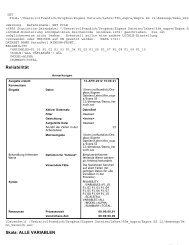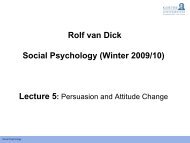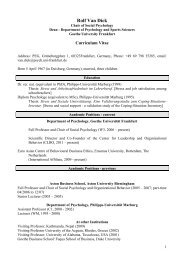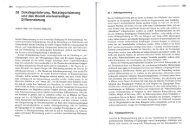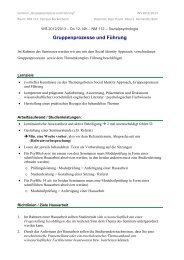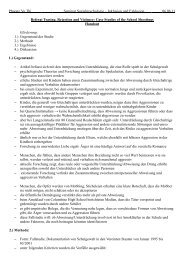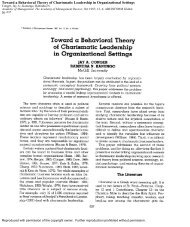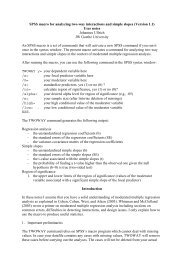Leadership-Interview-Transkript - Sozialpsychologie - Goethe ...
Leadership-Interview-Transkript - Sozialpsychologie - Goethe ...
Leadership-Interview-Transkript - Sozialpsychologie - Goethe ...
Erfolgreiche ePaper selbst erstellen
Machen Sie aus Ihren PDF Publikationen ein blätterbares Flipbook mit unserer einzigartigen Google optimierten e-Paper Software.
what you cannot do, you have to do it this way, you cannot do it this way. And so what that<br />
leads to I think is a suppression of personal initiative so many people in the workplace do not<br />
feel they have the ability to bring about change or to have influence to what happens in their<br />
organizations and they resist the changes that are imposed on them, because often they feel<br />
those changes will prevent them from doing their jobs as well as they would like to. So for me<br />
that is one of the key factors we need to really encourage cultures in organizations that foster<br />
innovation that encourage people to come up with ideas for new and improved ways of doing<br />
things.<br />
And I think the second obstacle that I have encountered is senior individuals within<br />
organizations who sometimes even say the right things about how to run an organization but<br />
what they do is inconsistent with that. And my opinion is where you have these<br />
inconsistencies between the espout values of leaders in organizations and what those leaders<br />
are actually doing in practice that that undermines trust and safety for all people within the<br />
organization. And as a consequence you begin to get toxicity and you begin to get …<br />
disengagement and you get the kind of stress that you are referring to. When we look in the<br />
National Health Service for example in the United Kingdom which has 1,37 Mio. Employees<br />
so a huge organization, 14 % of the people report being bullied by their managers mobbed by<br />
managers or colleges that’s like one in seven people and that has huge consequences in terms<br />
of absenteeism and the ability of the people to do their jobs effectively. It has to do with both.<br />
First bureaucratization, standardization and ruled banned nature of organizations and the<br />
second is to do leaders who do not practice what we would preach.<br />
Rolf van Dick: Now let me ask you a last question. How important do you think are values in<br />
our modern world or in organizations? And maybe you may link that to the previous<br />
questions.<br />
Michael West: I suppose I have come to the conception that work organizations are just<br />
another form of human community just like a village or a volunteer society or a church. It is a<br />
grouping of humans. But in the end Human communities operate because there is a shared set<br />
of values to which they subscribed explicitly or implicitly. And if we try to create work<br />
organizations where those basic values which were important to all communities are not in<br />
operation not knocked forward then those organizations in the long term will not be<br />
successful because the trust that you need within the community will be absent. I am talking<br />
about values like wisdom, knowledge and the desire for learning. So we need organizations<br />
where leaders are encouraging learning, wisdom and knowledge. Values like courage, the<br />
courage to have a vision of what kind of difference we want to make as a work organization,<br />
the courage to persist, the courage to act with integrity within the organization and also about<br />
humanity or more a value of humanity so that these organizations where there is a cultural of<br />
kindness where we are not nasty to each other, you know because that undermines<br />
effectiveness, where we do want to help and to support each other and a value of Justice<br />
where people are treated fairly, equally, where there is an emphasis on duty, loyalty,<br />
citizenship and humility in the terms of leadership. Furthermore a value of prudence where<br />
we are cautious and careful about how we behave as an example we don not take to many<br />
initiative neither sending of aggressive responses to e-mails. So we act in a way of prudence,<br />
caution, and temperance this is important in any community. And finally it is a value around<br />
wonder and spirituality. When I say spirituality I do not necessarily mean it in a religious<br />
sense, but any human community there is often in the sense of wonder and optimism about<br />
the future, humor, gratitude and appreciation for each other and for the contribution that we<br />
create. It seems to me that those are the sorts of value, which underpin effective human<br />
communities and that we need leaders to embody not just to espouse they really have to<br />
embody if they want to be a creative and effective organizations. I do not belief that creating




